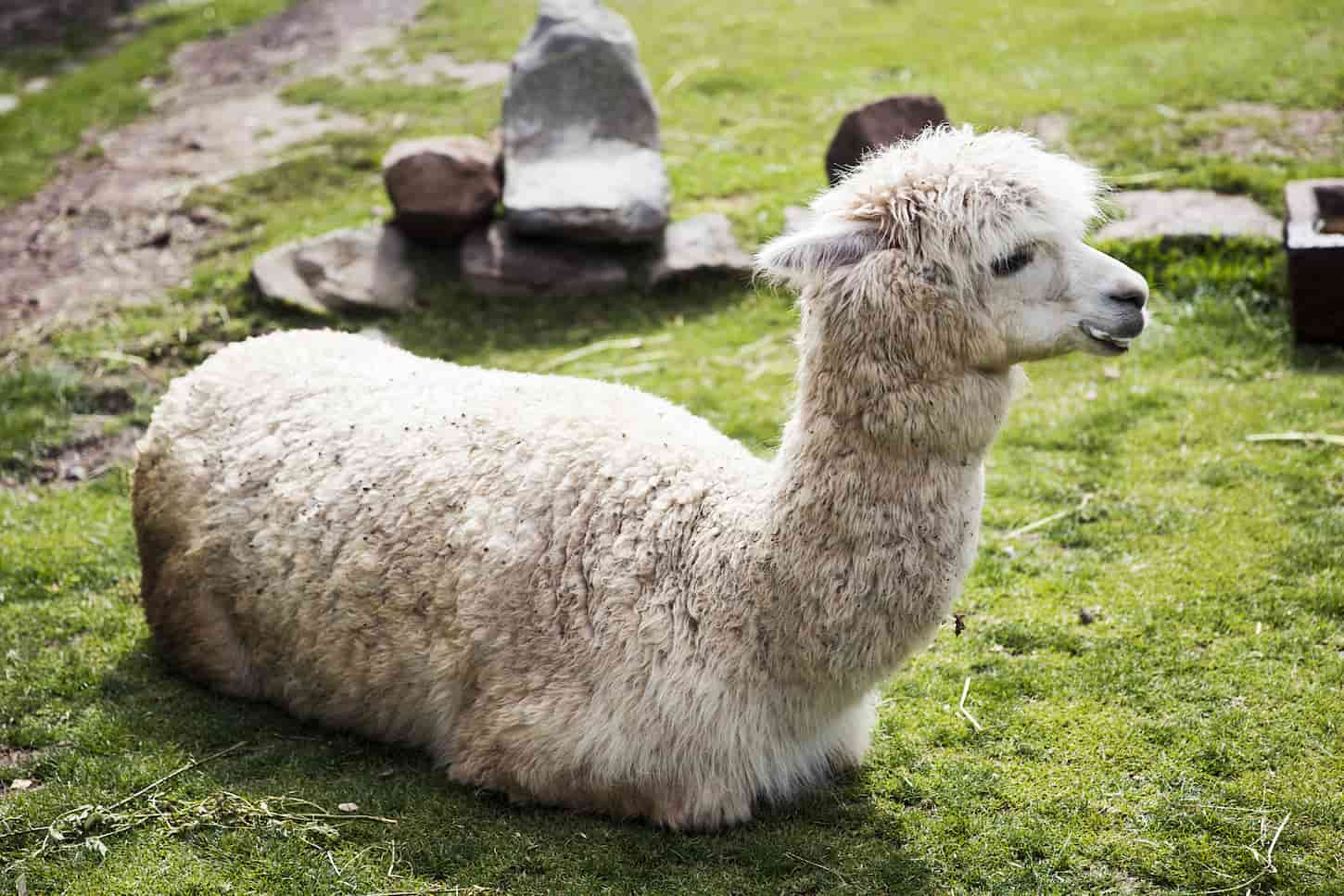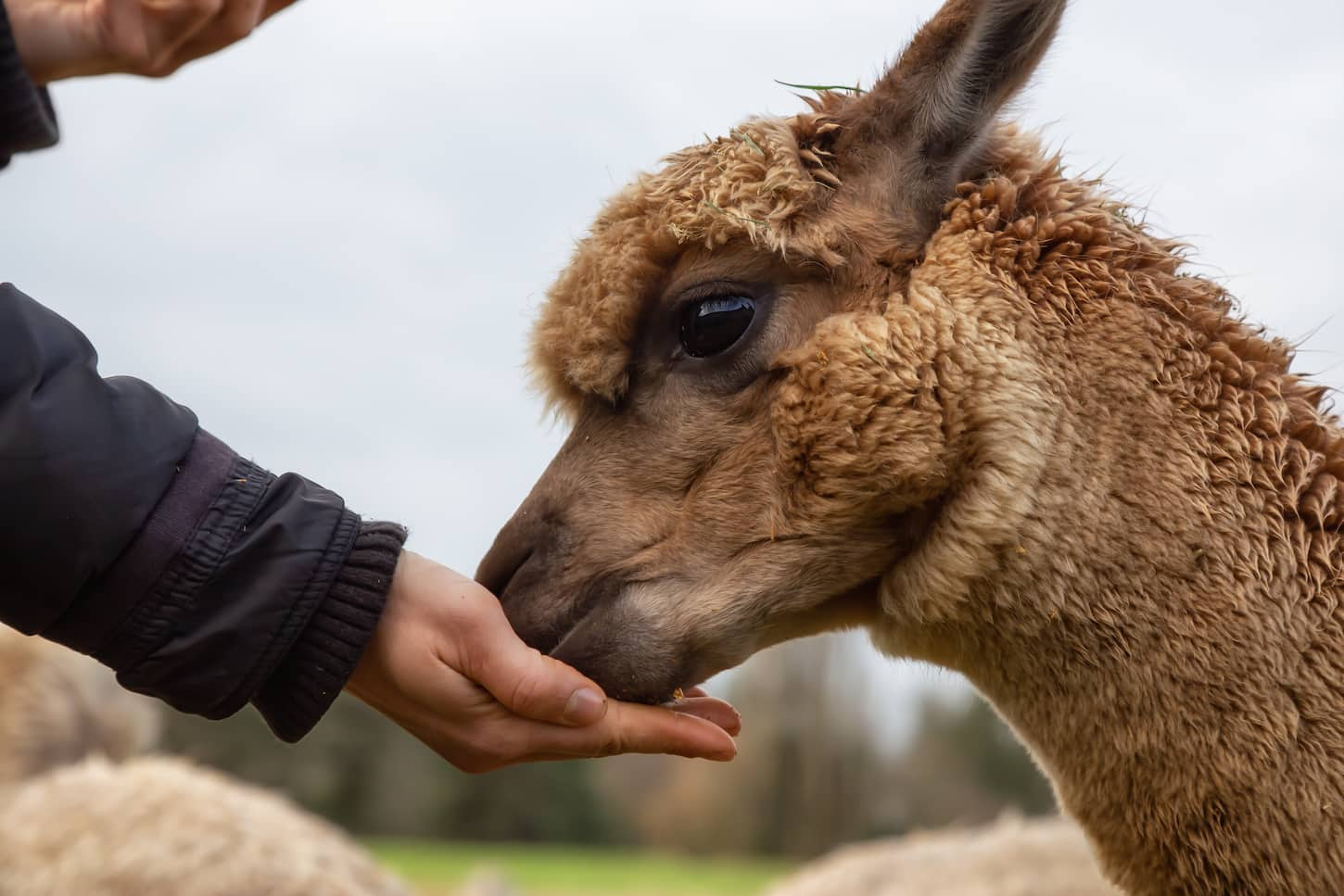Is your alpaca laying down more often or having trouble getting up? Is this a concern worth your time or simply a sign that your alpaca is tired? We will cover exactly what it means when your alpaca lays down, how to check if your alpaca is unwell, and what to do should your alpaca need additional assistance.
If an alpaca won’t get up, it may mean it is unwell depending on what else it is (or isn’t) doing. Keep a close eye on how often the alpaca is laying down, if it is struggling to get up, and other symptoms that can help diagnose whether or not the alpaca is sick or potentially has worms.
Keep reading for help on how to approach these concerns with the right knowledge and skills to best support your alpaca.

Do Alpacas Lay Down a Lot?
Alpacas are fans of afternoon naps in the sunshine. Some alpacas enjoy laying down during these afternoon naps. Pay close attention to an alpaca’s regular routines and nap times, as this can help diagnose trouble versus a habit.
Just like many animals, there is not an exact amount of laying down that is considered normal or abnormal by professionals. Each alpaca is different and has unique habits. Some may be more prone to lying and others may be more active.
Paying close attention to your alpaca’s routine is the best way to know whether your alpaca is enjoying an afternoon slumber or having trouble getting up.
What Does It Mean When an Alpaca Lays Down?
If your alpaca is laying down, it is not an immediate sign of concern. Alpacas are commonly found lying down for sleep throughout the day. In fact, alpacas are notorious sunbathers, soaking up the sun whenever they get the chance.
If you find your alpaca laying motionless, don’t immediately panic. Though they may look immobile or in need of assistance, most of the time they’re perfectly content and happy laying about throughout the day.
When resting, alpacas most often sleep in a “cush” position. The cush position may be a familiar site as alpacas tend to fold their legs under themselves to keep warm.
However, if your alpaca is laying down and has difficulty or won’t get up to move about throughout the day, this could be a sign that your alpaca is sick. If you notice your alpaca is struggling to get up from the cush or another position, seeking out more information may help in diagnosing whether they are just resting or in need of further assistance.
What Do You Do With a Sick Alpaca?
Sick alpacas should be monitored for easier diagnosis by the owner, and any caretakers, and cared for by a qualified veterinarian as needed.
If you find that your alpaca is sick, there are specific steps you can take to help your alpaca heal. First, you should understand the signs of a sick alpaca. Extended periods of laying down may be the first sign of an unwell alpaca.
Alpacas tend to be routine-oriented. If you notice your alpaca is doing anything out of the norm, this can be a sign of illness. Furthermore, if your alpaca is less aware or generally less sociable than normal, this may be a cause for concern.
If you believe your alpaca is unwell, these steps may be of help upon the initial assessment:
- Observe the behavior carefully. What is different? What is causing concern?
- Consider taking the alpaca’s temperature. If urgent, taking the rectal temperature of your alpaca can be an initial assessment to show you how serious the issue may be. A temperature of 100-102 degrees is normal for an alpaca.
- Seek out a veterinarian who has experience with alpacas. Though you may know your alpaca better than anyone, veterinarians are trained to properly treat animals safely.
- Do not guess! Trying to solve a symptom can cause much more harm than good if you’re unsure of the problem. Though you may be tempted to alleviate your alpaca’s symptoms, wait on the experts for treatment.
And, if I could offer the most important piece of advice? Don’t wait until there’s a problem to find a veterinarian who knows alpacas. Find one before you bring any alpacas home. That way, you’ll already have that invaluable resource in place before there are any problems.

What Does It Mean When an Alpaca Is Gasping and Won’t Get Up?
Alpacas that struggle to get up may simply be exhausted, whereas alpacas that can’t get up and gasp are likely suffering from a respiratory or neurological illness.
Alpacas are susceptible to various diseases and illnesses that can affect their respiratory or neurological systems. If you find your alpaca is struggling to get up or is having trouble breathing, this is likely a sign of weakness caused by exhaustion or illness.
If you notice that your alpaca won’t get up and is gasping for air, first observe its surroundings. What have they eaten recently? Are they alone or surrounded by other animals? What is the climate? Has this happened before? Have they perhaps gotten into something that’s poisonous for them?
If you’ve never noticed this sort of behavior before or don’t recognize any other immediate causes for the distress, we recommend calling a veterinarian for assistance.
How Do I Know if My Alpaca Has Worms?
The safest way to know if an alpaca has worms is through a fecal test or by diagnosis by a properly licensed veterinarian, as commonly-cited “symptoms” of worms are actually symptoms of multiple issues and diseases.
If your alpaca won’t get up, you may be concerned about the potential of your alpaca having worms. Alpacas can be carriers of various sheep and cattle internal parasites or worms. While younger alpacas (2 years or younger) usually deal with these parasites rather well, it is worth understanding how to recognize if your alpaca has worms.
Though you may be tempted to diagnose your alpaca with worms because of visual symptoms such as diarrhea, pallor of eye membranes, poor exercise tolerance, or issues getting up after laying down, the NSW Department of Primary Industries (in Australia) advises against jumping to conclusions, as these may be symptoms of other diseases or illnesses.
The safest way to know if your alpaca has worms is to seek the advice of a qualified veterinarian and have them run a fecal test for worms.

Next Steps
Be vigilant and stay aware! Alpacas love to lie about and soak up the sunshine. Just because they’re laying down does not mean you need to panic.
If you notice that your alpaca is laying down more often, won’t get up, or is showing other signs of illness, check their surroundings, take their temperature, and consult a professional for further testing and diagnosis.
Need some more help understanding basic alpaca behaviors? Make sure you read these other articles we’ve written:
- Alpaca Sounds 101: 9 sounds & their meanings
- This is the Right Way to Approach and Interact with Alpacas
Or, if you want to take things back a step further to basic alpaca feeding and watering information, here is what we’ve written on that:
- How Much Water Do Alpacas And Llamas Drink A Day?
- What Do Alpacas And Llamas Eat?
- 29 Best Treats for Alpacas (and 51 Treats to Avoid)
Each of these articles will give you great insights into how alpacas should behave, as well as how much food and water they need (they need a good bit!). So give them a read, and enjoy your alpacas, whether they’re already in your backyard homestead or still part of the plan!
Resources
Learning from your own experience is essential, but learning from others is also intelligent. These are the sources used in this article and our research to be more informed as homesteaders.
- Aubrey Oaks Alpacas. “Medical Care – Aubrey Oaks Alpacas.” Aubrey Oaks Alpacas, 26 Sept. 2020, aubreyoaksalpacas.com/learn-about-raising-alpacas-introduction/medical-care.
- Breezy Hill Alpaca Farm. “6 Important Alpaca Health Indicators to Be Aware Of.” Medium, 3 Apr. 2017, medium.com/@alpacafarmsinmd/6-important-alpaca-health-indicators-to-be-aware-of-fdc3b5fed9d6.
- Love, Stephen, Veterinarian. “Alpaca Worms – an Overview.” NSW Government Department of Primary Industries, Dec. 2017, www.dpi.nsw.gov.au/__data/assets/pdf_file/0004/318217/Alpaca-worms-an-overview.pdf.
